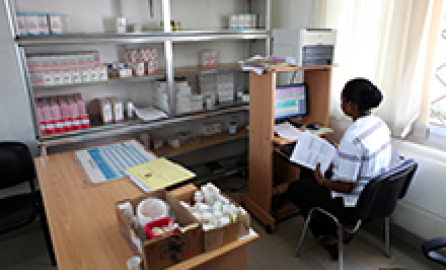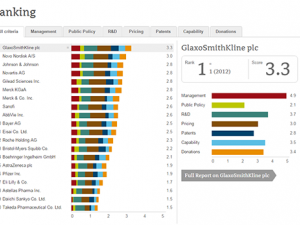There are still 2 billion people in the world today without access to medicine. “We cannot solve this problem without the efforts and cooperation of many people and organisations,” said Wim Leereveld, founder and CEO of the Access to Medicine Foundation (AMF).
The AMF is a non-profit organisation that publishes the Access to Medicine Index every two years, providing a transparent ranking of major pharmaceutical companies’ individual efforts to improve access to medicine. Their methodology evaluates seven factors (including Research & Development (R&D), Pricing and Product Donations) across four pillars (Commitments, Transparency, Performance and Innovation). Rather than seeing the Index as a tool for punishing bad behaviour, their aim is to highlight and encourage positive conduct.
The major players in the industry are assessed, but they’re also given a mechanism for sharing best practices and collaborating. “They’re interested to learn from each other,” said Leereveld. He cites GlaxoSmithKline (GSK) as an example of good management practices that have been rewarded with a top ranking on the Index. “One of the reasons [that they top the index] is that they decided to judge, to measure their own employees, their own directors in [developing] countries on how many patients they reach instead of how much profit they make,” explained Leereveld.
The Access to Medicine Index
This shifts the focus from profits to people in regions where access to medicine is still a matter of life or death. Equitable pricing strategies across different countries, structured donation programs and having relevant drugs in the R&D pipeline are other examples of different companies’ good practice that was recognised in the 2014 Index.
Leereveld acknowledges that pharmaceutical companies are realising that improving access to medicine represents not just a societal good, but also a strong business case. The lack of access in developing markets presents a win-win opportunity in which companies can grow their consumer base and build capacity, while also contributing societally.
In order for them to be able to mobilise and fulfil these needs, however, Leereveld believes that the industry needs greater consensus from the development community on how to prioritise. “Yes, companies I think are interested in helping us solve the problem, but we should help them help us,” he said. There are many different voices coming out of the global healthcare community that often present conflicting messages to industry.
“If the World Health Organization has a different view than, for example, Médécins Sans Frontiers or our governments or perhaps the investors, then industry won’t listen to all of us,” Leereveld said, “We should be united in what we want from them or at least organise a consensus on pricing on patents on research and development.”
The industry’s aversion to risk is also a barrier to improving access to medicine. Companies have no incentive to develop, for example, an AIDS treatment for children when the disease has been virtually eradicated in developed markets. However, by implementing policy mechanisms or raising awareness through tools such as the Index, companies are able to justify investing in new areas of research that were previously considered too risky.
As a non-profit, the AMF relies on donations to carry out its evaluation of the pharmaceutical industry, relying strictly on funding sources independent of the pharmaceutical giants. “It’s very important we don’t ask companies to put any money,” he said, “Companies are not able in any way to have any influence and that’s why I think they respect us.” The Bill and Melinda Gates Foundation, the UK’s DFID, and the Dutch government are among its supporters.
Raising awareness of the Index will be key to ensuring it is successful in improving access to medicine worldwide. As part of his efforts to increase the Index’s profile, Leereveld attended the European Development Days 2015 in Brussels this past June and recently met with the European Parliament. “We know the European Parliament takes the Index into account, but they should tell us. They should tell it to the world, they should tell it to these pharmaceutical companies to raise awareness for the Index,” he said, “Because it can only work if you pay attention.”
|
The European Commission (EC) recently agreed on a proposal to support least developed countries' (LDCs) call for an indefinite exemption from the World Trade Organization (WTO) intellectual property rules for pharmaceuticals; thus facilitating their access to cheaper medicines. If adopted, this exemption will allow LDCs to legally procure or produce generic medicines, complementing EC funded development programmes for the supply of essential medicines in developing countries. Previously the WTO had granted a time-limited exemption to LDCs, but the EC believes that extending this to an indefinite time period provides legal certainty for long-term supply as well as enhancing local production of medicines. “The poorest countries of the world need effective access to medicines,” noted European Commissioner for Trade, Cecilia Malmström.
Did You Know?
Further Reading Voices & Views
Groups |
This collaborative piece was drafted by Emma Brown with support from the capacity4dev.eu Coordination Team. Teaser image of a medical dispensary in Dar Es Salaam, copyright of European Commission.


Log in with your EU Login account to post or comment on the platform.